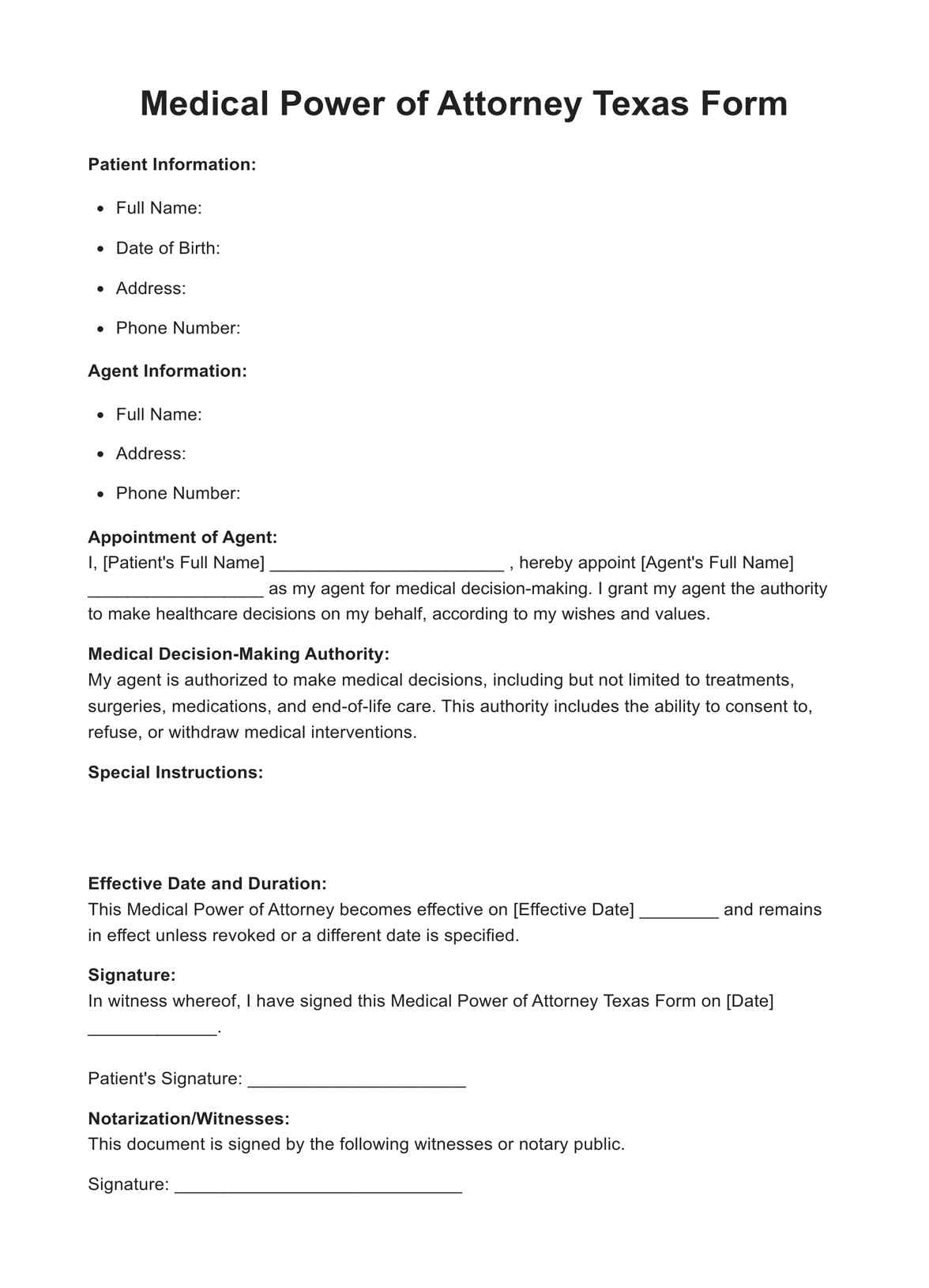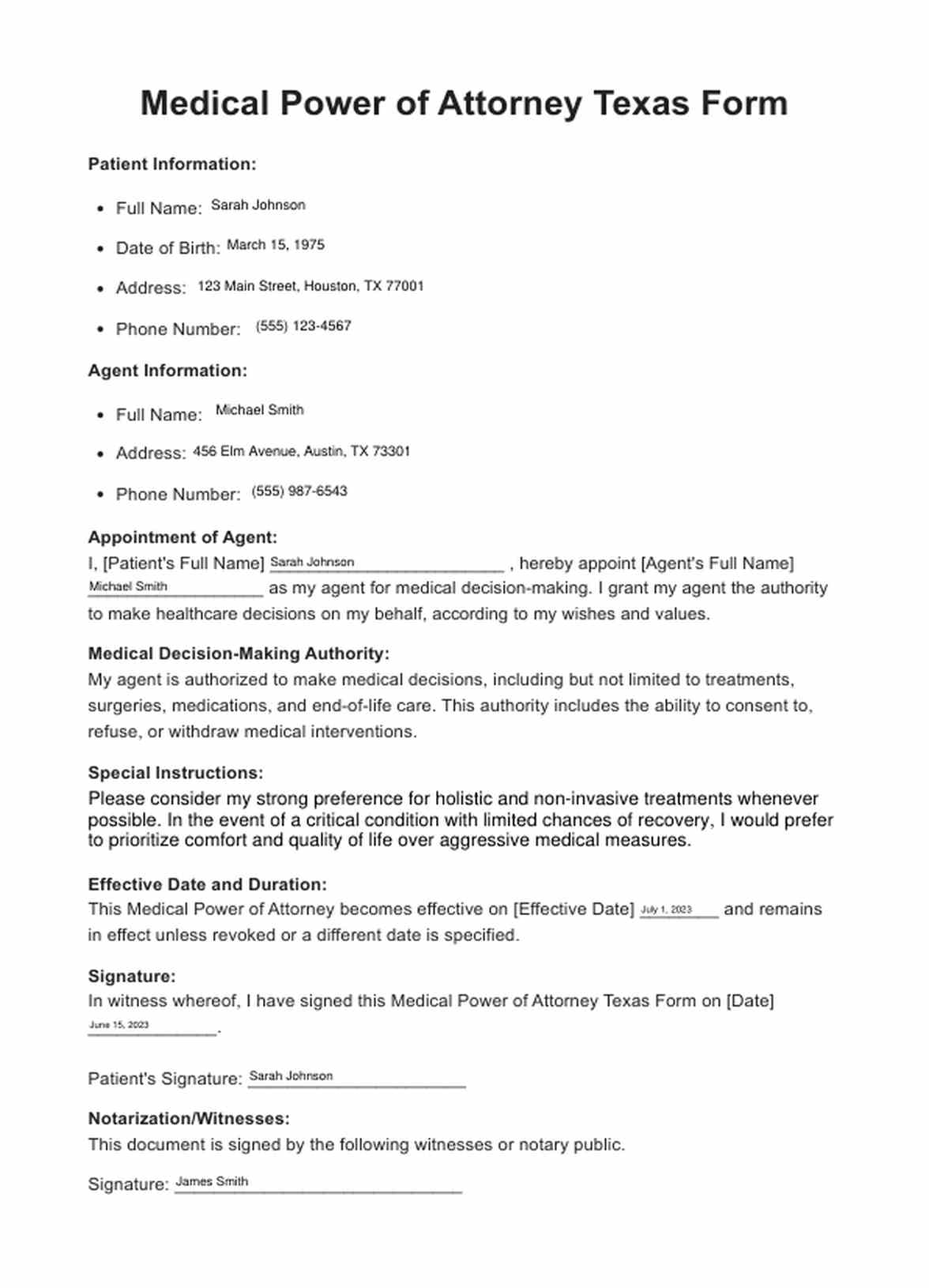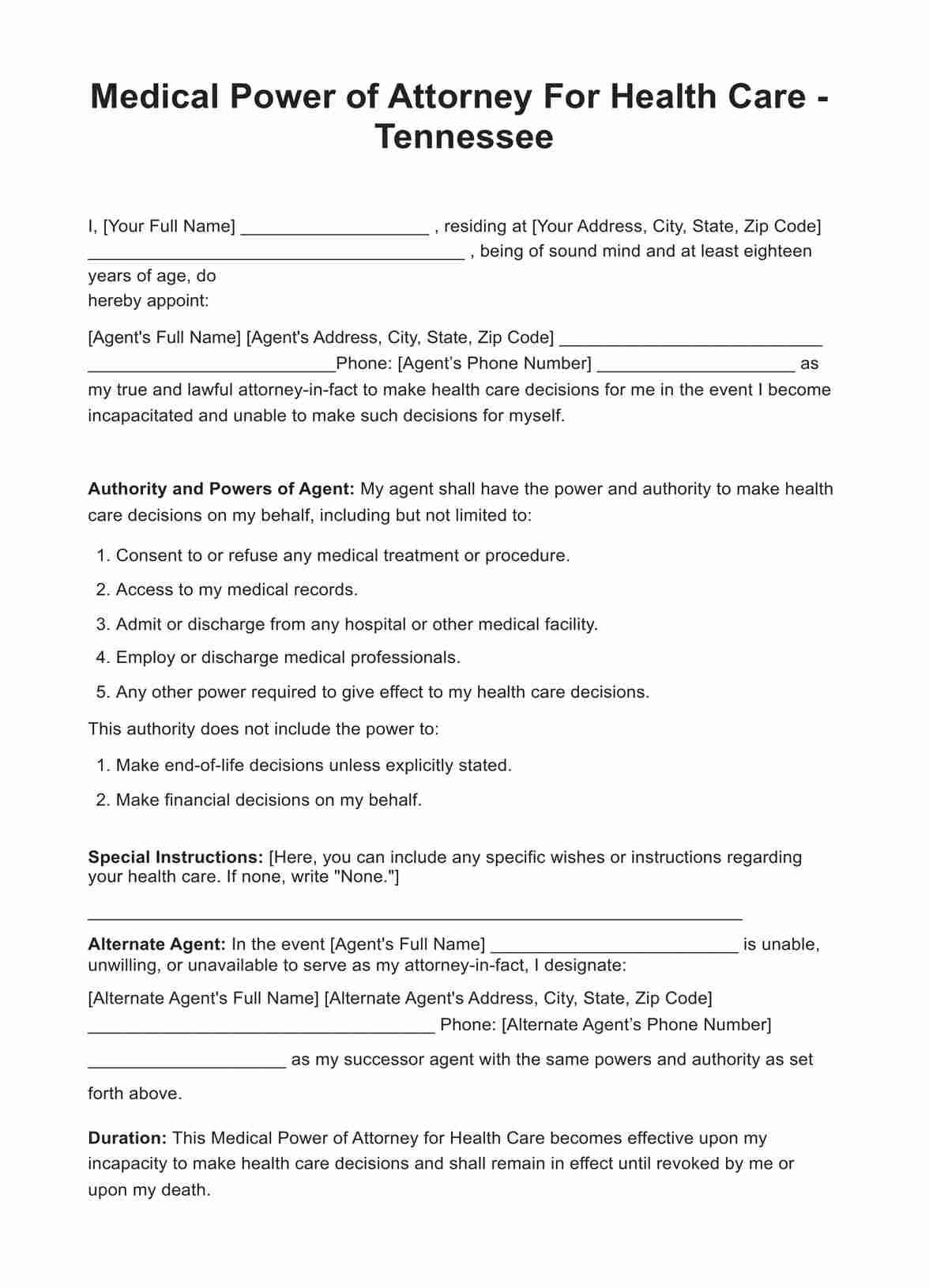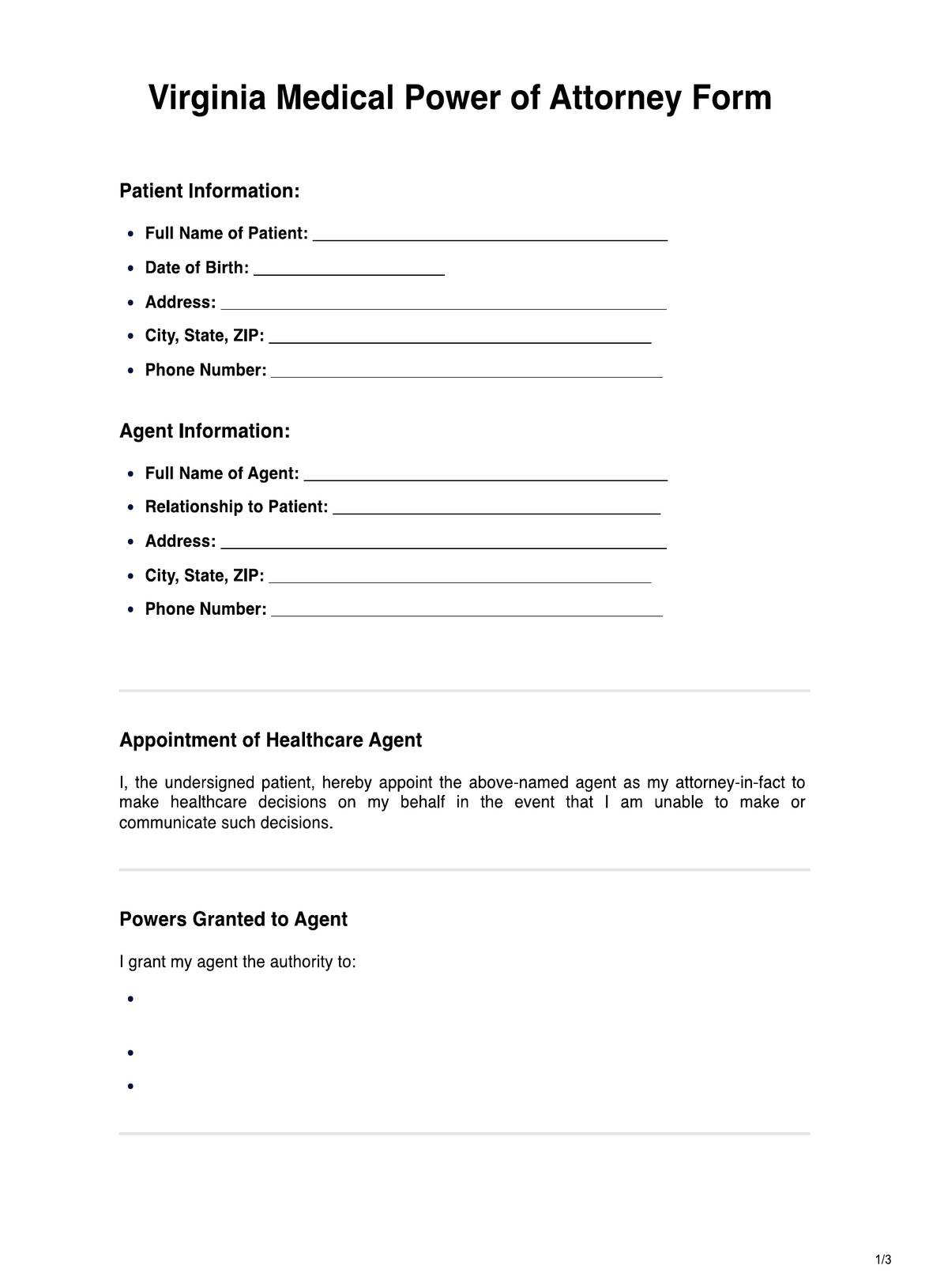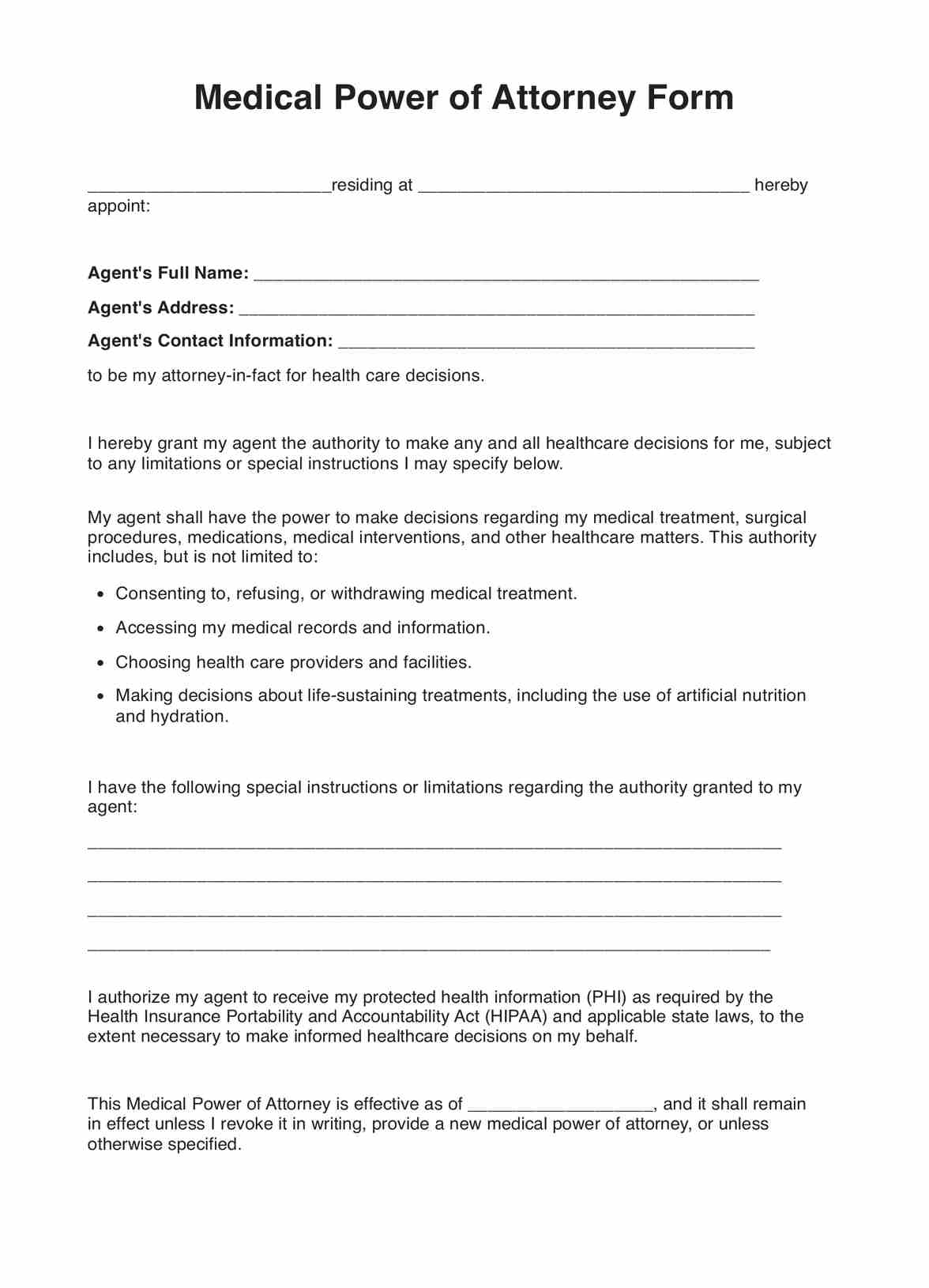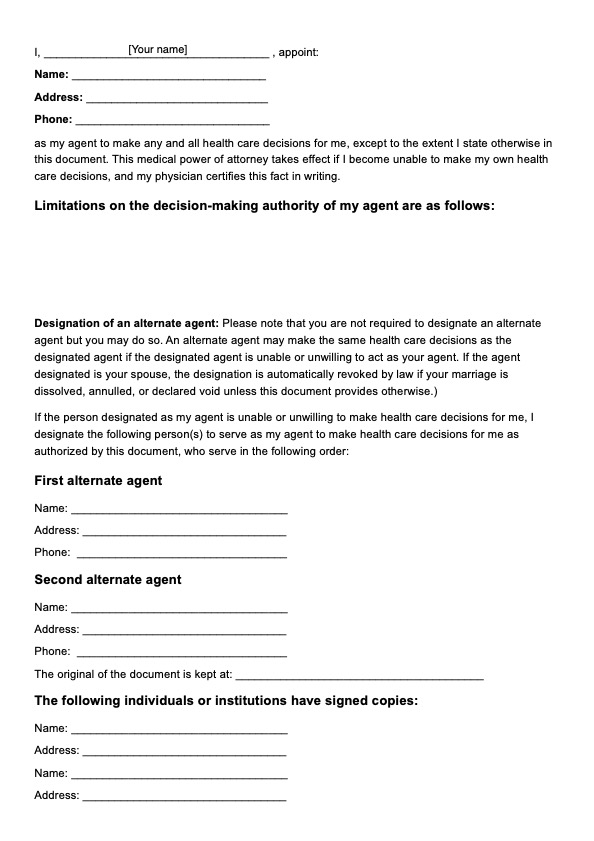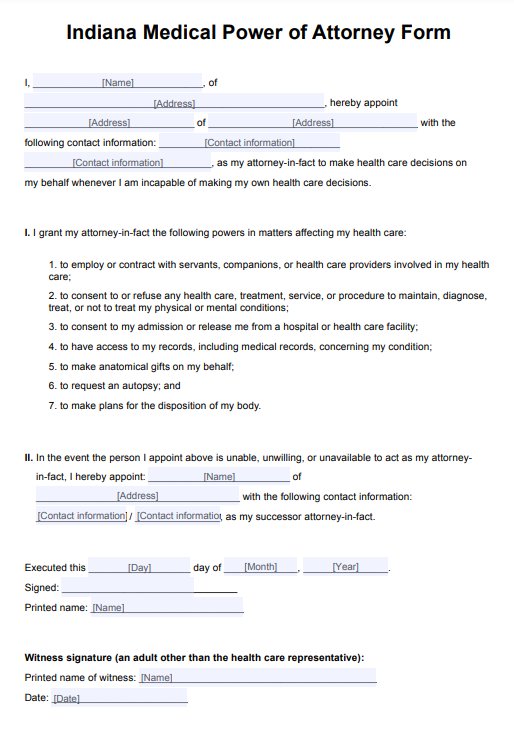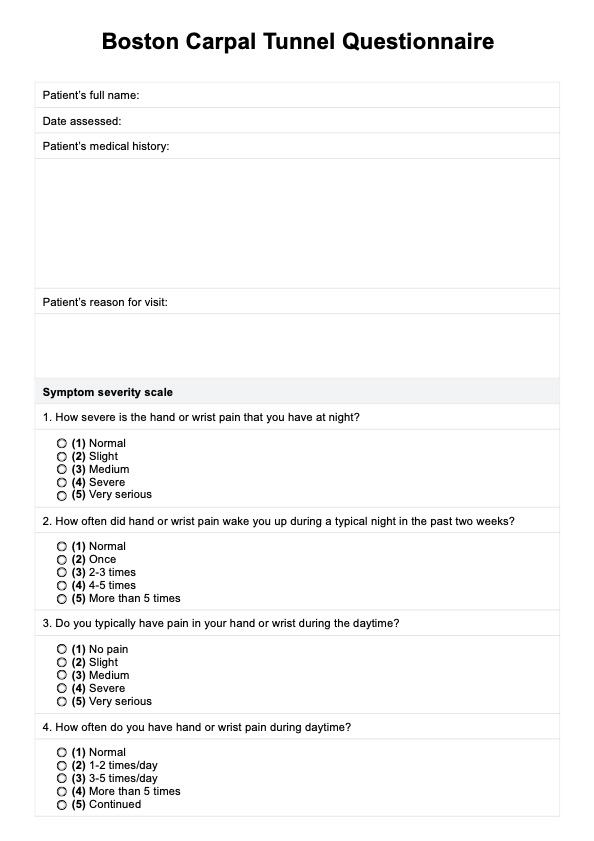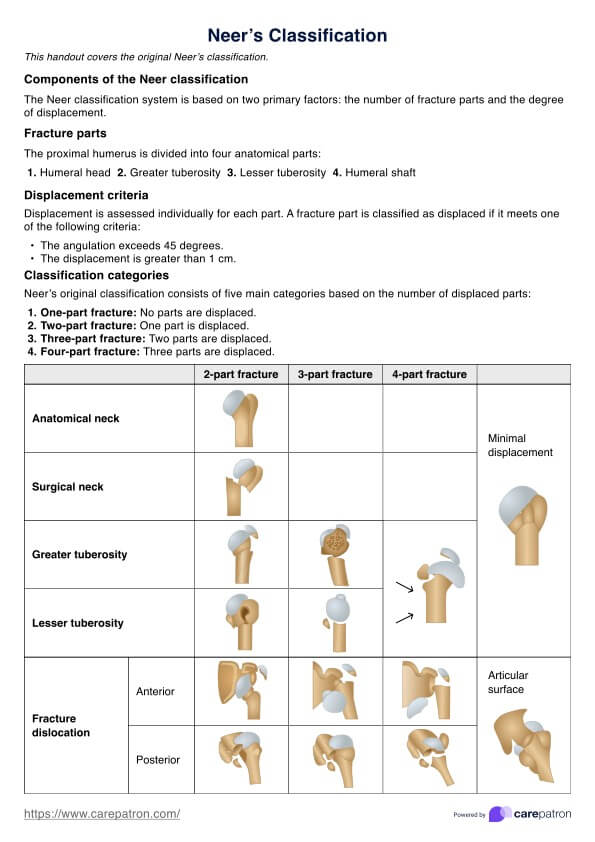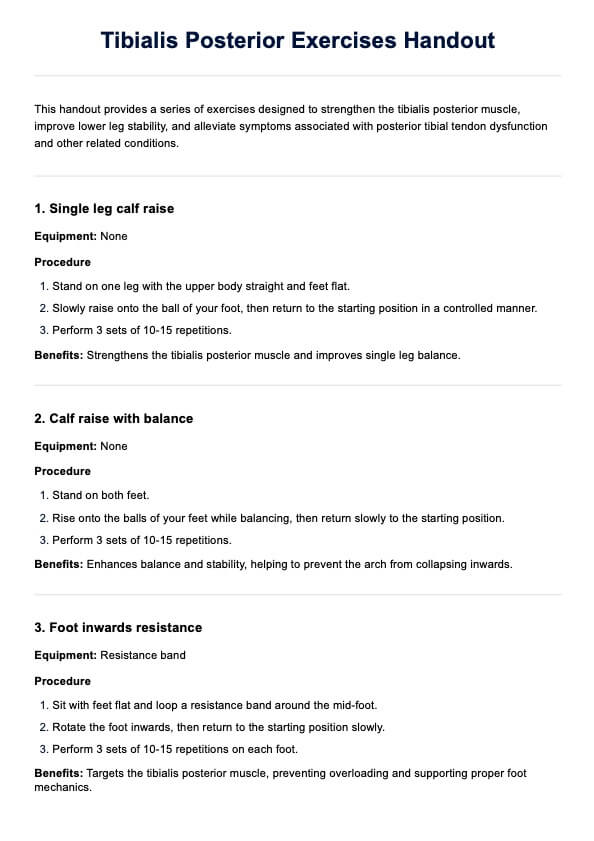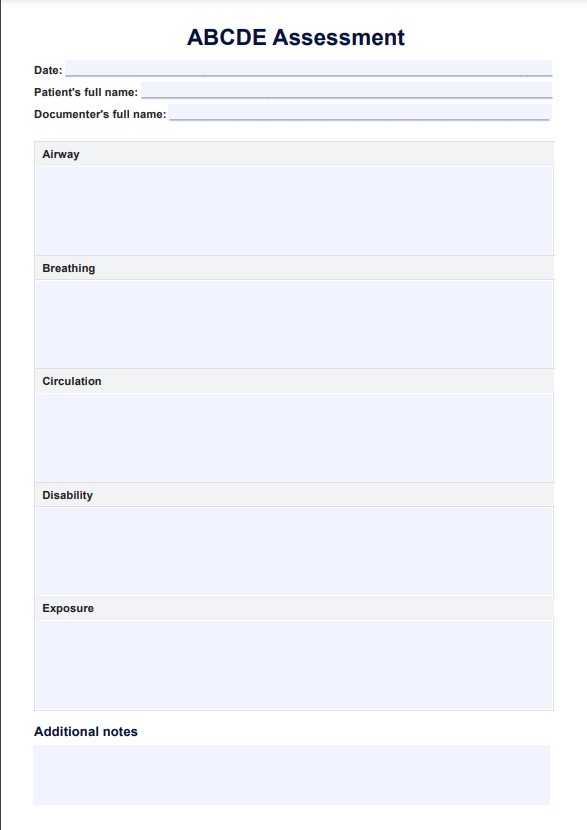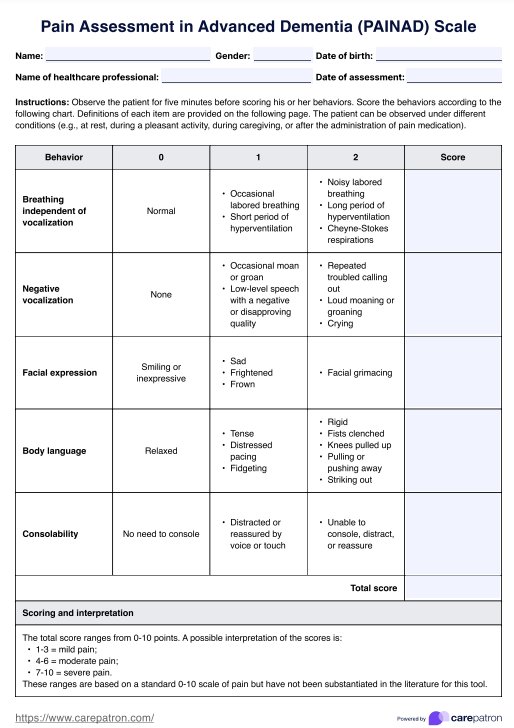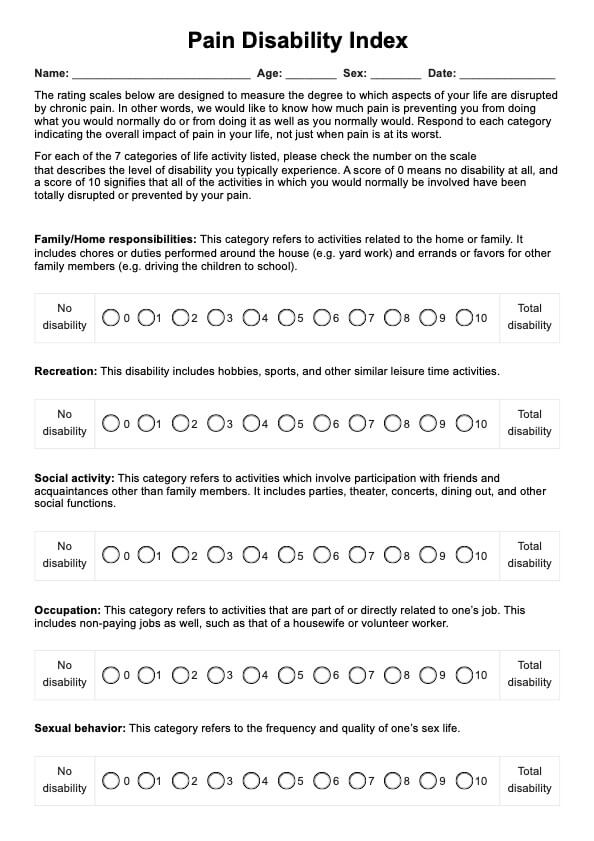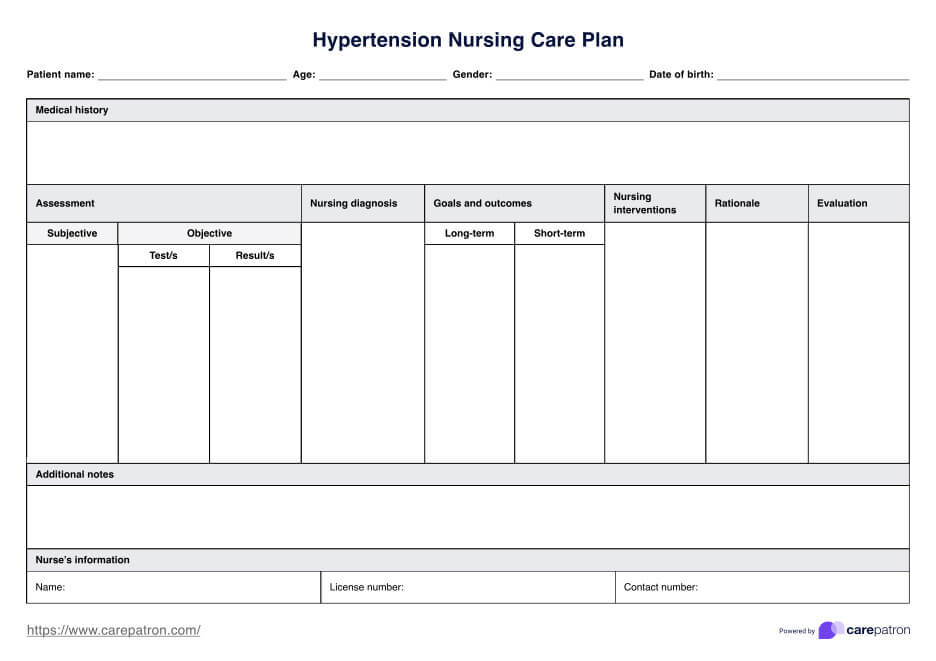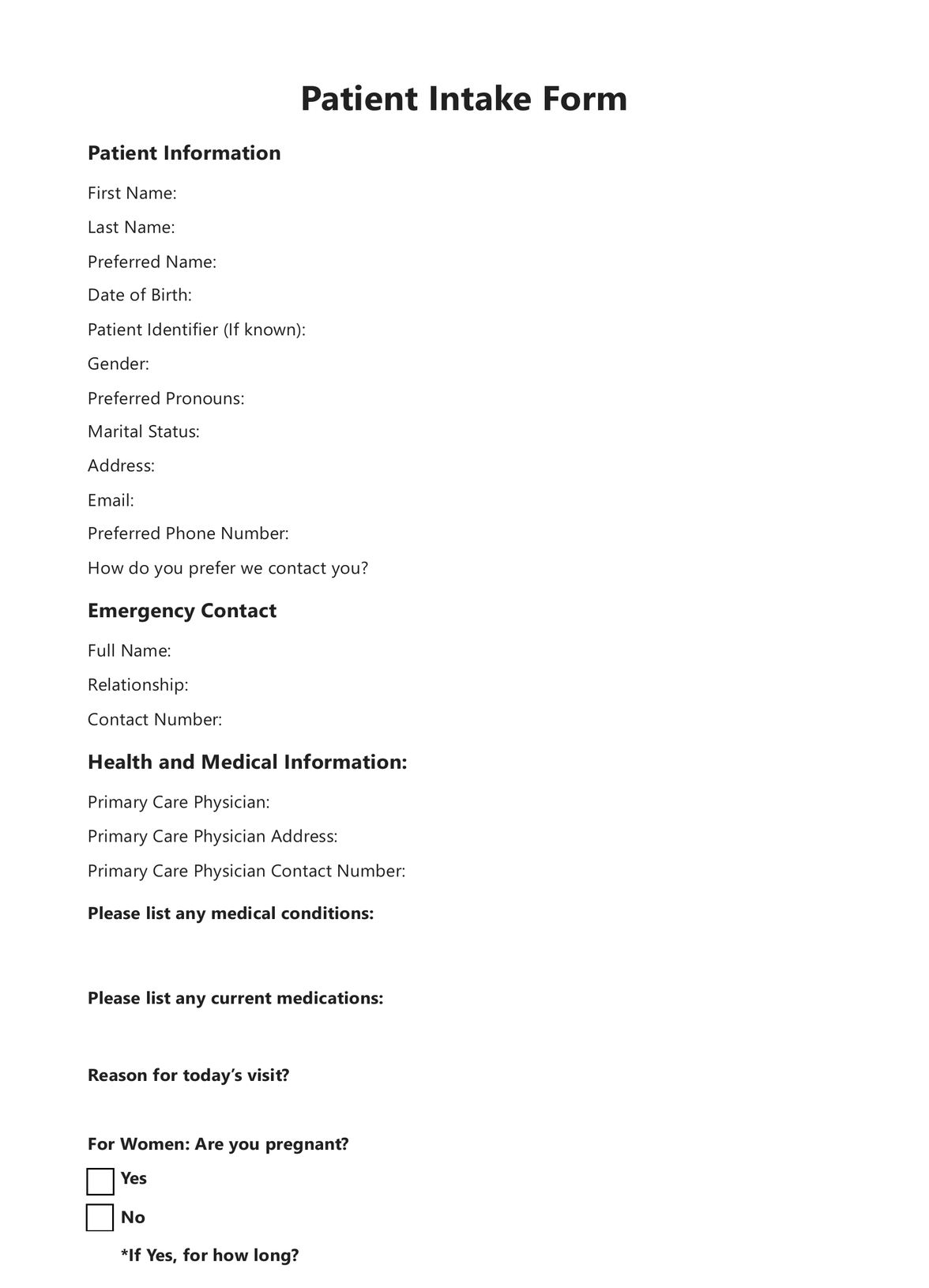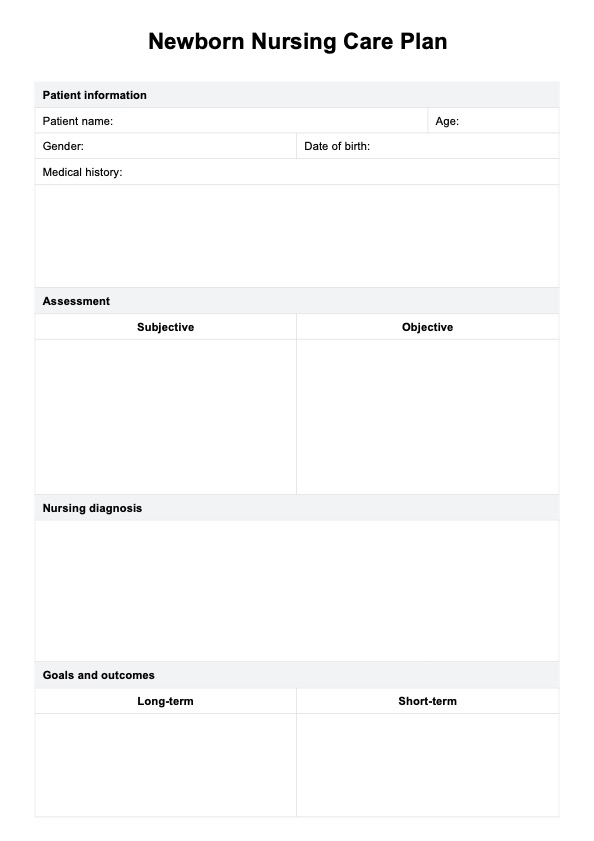Medical Power Of Attorney Texas Form
Create a legally binding Medical Power of Attorney Texas form to ensure your healthcare decisions are respected even when you can't voice them.


What is a Medical Power Of Attorney Texas Form?
A Medical Power of Attorney Form is a legal document that allows an individual to designate someone else to make healthcare decisions on their behalf if they become incapacitated or unable to communicate their wishes. This legal tool is a crucial part of advanced care planning, enabling individuals to ensure their medical treatment preferences are honored even when they cannot voice them themselves.
The Medical Power of Attorney Texas Form is recognized under the Texas Health and Safety Code. It empowers the designated agent, often referred to as a healthcare proxy or agent, to make medical decisions in alignment with the person's known wishes or best interests. These decisions can range from treatments, surgeries, and medications, to end-of-life choices like resuscitation or organ donation.
The form outlines specific instructions, limitations, and conditions for the agent's decision-making authority. It can be tailored to suit the individual's unique preferences and needs. This legally binding document ensures that healthcare providers and medical institutions recognize the agent's authority and follow their decisions.
Carepatron, a reputable healthcare management platform, offers resources related to clinical documentation and medical procedures, including the . Accessing this resource can provide comprehensive and accurate information about the legal requirements, form completion, and the significance of a Medical Power of Attorney in Texas.
A Medical Power of Attorney Texas Form is an essential legal instrument that allows individuals to appoint a trusted person to make medical decisions in case of incapacity. This ensures their healthcare preferences are respected, and the CarePatron resource can further guide this important legal document.
Medical Power Of Attorney Texas Form Template
Medical Power Of Attorney Texas Form Example
How does it work?
Using a Medical Power of Attorney Texas Form involves several steps to ensure your healthcare preferences are respected and upheld. Below are the key steps to follow when using and filling out this important legal document:
Step 1: Obtain the Form
Start by acquiring the Medical Power of Attorney Texas Form. You can find printable versions online, often from reliable sources like legal websites or healthcare management platforms.
Step 2: Understand the Document
Carefully read through the form to understand its content, including the agent's authority, instructions, limitations, and conditions. Ensure you comprehend the legal implications of designating an agent to make healthcare decisions on your behalf.
Step 3: Choose an Agent
Select a trusted individual to be your healthcare agent. This person should understand your values, preferences, and wishes regarding medical treatment.
Step 4: Discuss Your Preferences
Discuss your medical treatment preferences thoroughly with your chosen agent. Discuss your values, beliefs, and specific medical decisions you would like them to make on your behalf.
Step 5: Complete the Form
Fill out the Medical Power of Attorney Texas Form accurately and completely. Provide your personal information, your agent's details, and any instructions you want them to follow.
Step 6: Sign the Form
As Texas law requires, sign the form in the presence of a notary public or witnesses. This step is essential to validate the document and ensure its legal enforceability.
Step 7: Distribute Copies
Make multiple copies of the signed and notarized form. Provide copies to your agent, healthcare providers, family members, and relevant institutions to ensure everyone knows your designated agent's authority.
Step 8: Review and Update
Periodically review and update the Medical Power of Attorney Texas Form. Changes in your health status, preferences, or your agent's availability might necessitate revisions to the document.
When would you use this Form?
A Medical Power of Attorney Texas Form allows designated agents to make healthcare decisions for patients who cannot make their own. Here's when this form becomes essential, catering to various situations and needs:
- Incapacity Due to Illness or Injury: When an individual becomes incapacitated due to severe illness, injury, or mental condition, they may require someone else to make medical decisions. The Medical Power of Attorney Texas Form is utilized to formally designate a trusted agent to make healthcare choices by the patient's known wishes.
- Surgical Procedures and Anesthesia: Before undergoing surgical procedures or receiving anesthesia, patients might opt to complete a Medical Power of Attorney Texas Form. This ensures the agent can make decisions aligned with the patient's preferences without delay if unexpected complications arise.
- Chronic Medical Conditions: For individuals with chronic illnesses that might lead to periods of incapacity, having a designated agent outlined in the form can provide peace of mind. The agent can ensure that medical decisions, treatments, and interventions align with the patient's long-term wishes.
- End-of-Life Decision-Making: When a patient faces terminal conditions or irreversible states of unconsciousness, the Medical Power of Attorney Texas Form guides agents in making compassionate end-of-life choices, such as continuing or discontinuing life support, organ donation, and palliative care.
- Avoiding Family Disputes: Completing this form in advance can prevent family disagreements regarding medical decisions. Agents can confidently carry out their responsibilities when the patient's preferences are clearly outlined, minimizing potential conflicts.
- Preventing Unwanted Medical Interventions: If a patient has specific beliefs, values, or desires regarding medical treatment, the form ensures that these wishes are respected, even if the patient can't communicate them at the time.
Benefits
A Medical Power of Attorney Texas Form offers several significant advantages for individuals and their designated agents when making important healthcare decisions. Here are the key benefits of utilizing this form:
Clarity and Control
The form allows individuals to clearly express their healthcare preferences and values, ensuring that their medical treatment aligns with their wishes even if they can't communicate them later.
Designated Decision-Maker
By designating a trusted agent in the form, individuals ensure that someone familiar with their preferences is empowered to make healthcare decisions on their behalf, reducing uncertainty.
Timely Decision-Making
In urgent medical situations, having a designated agent streamlines decision-making, ensuring that treatment options are chosen promptly according to the patient's preferences.
Family Harmony
The form can prevent disagreements among family members about medical choices, as the patient's preferences are explicitly stated, leaving little room for ambiguity.
Legal Validity
When correctly executed, the form holds legal validity, ensuring that healthcare providers and institutions honor the designated agent's decisions without hesitation.
Protection of Interests
The form safeguards an individual's values, beliefs, and interests in medical treatment, protecting them from receiving care that contradicts their principles.
Continuity of Care
For patients with chronic illnesses or long-term care needs, the form ensures that healthcare decisions consistently align with their evolving preferences.
Free Access
Many resources, including platforms like Carepatron, provide free access to the form, making it accessible to a broader range of individuals.
Using a Medical Power of Attorney Texas Form brings peace of mind, empowers agents to act on behalf of the patient's wishes, and minimizes confusion during critical healthcare moments. It is a proactive measure that ensures an individual's voice is heard even when they cannot speak for themselves.
Research & Evidence
A medical power of attorney allows designated individuals to make healthcare decisions for someone incapacitated. It stems from recognizing the need for individuals to have their medical preferences respected even when they can't communicate.
Over the years, legal and medical experts have worked collaboratively to develop frameworks that enable individuals to designate trusted agents for healthcare decision-making. This approach gained momentum as healthcare systems evolved and patients' rights and autonomy became more central to medical ethics.
Medical ethics and law research has consistently supported medical power of attorney forms. This research highlights the importance of:
- Patient Autonomy: The principle of patient autonomy emphasizes an individual's right to make informed decisions about their medical treatment. A medical power of attorney form embodies this principle by allowing patients to appoint someone who understands their values and preferences.
- Ethical Decision-Making: Medical power of attorney forms provide a structured way to ensure that healthcare decisions are ethically sound and aligned with the patient's wishes. This is particularly important when patients cannot communicate their preferences.
- Reducing Family Conflicts: Research has shown that designated decision-makers, through legal forms, reduce conflicts among family members during critical healthcare situations. This contributes to a more supportive and harmonious environment for patients and their families.
- Legal Validity: The legal recognition of medical power of attorney forms assures healthcare providers and institutions that the designated agent's decisions are legally binding. This helps streamline decision-making and treatment procedures.
- End-of-Life Care: Medical power of attorney forms are crucial in end-of-life care. Research highlights the importance of early discussions and documentation of preferences, ensuring that patients receive the care they desire during their final stages of life.
References
- eForms. (2023). Texas Medical Power of Attorney Form. eForms. https://eforms.com/power-of-attorney/tx/texas-medical-power-of-attorney/
- Free Medical Power of Attorney Form | Texas. (n.d.). https://powerofattorney.com/texas/medical-power-attorney-texas-form-pdf-rtf-word/
- Free Texas medical Power of Attorney form. (2023, June 13). Free Forms. https://freeforms.com/poa/tx/medical/
- Legal Templates. (2023, July 9). Free Texas Medical Power of Attorney Form | PDF & Word. https://legaltemplates.net/form/medical-power-of-attorney/texas-tx/
- Texans, L. H. F. (2023). Medical power of attorney. TexasLawHelp.org. https://texaslawhelp.org/article/medical-power-of-attorney-information-and-answers-to-common-questions
Commonly asked questions
Medical Power of Attorney Texas Forms select a representative to make healthcare decisions when you can't communicate. It's ideal for those with chronic illnesses, the elderly, and anyone who wants their medical preferences honored.
Medical Power of Attorney Texas Forms let someone make medical decisions for you if you can't. It's important for surgeries, chronic illnesses, and end-of-life planning.
Use Medical Power of Attorney Texas Forms, get a reliable form, choose an agent, discuss preferences, sign with witnesses, and share copies. Review and update periodically.


